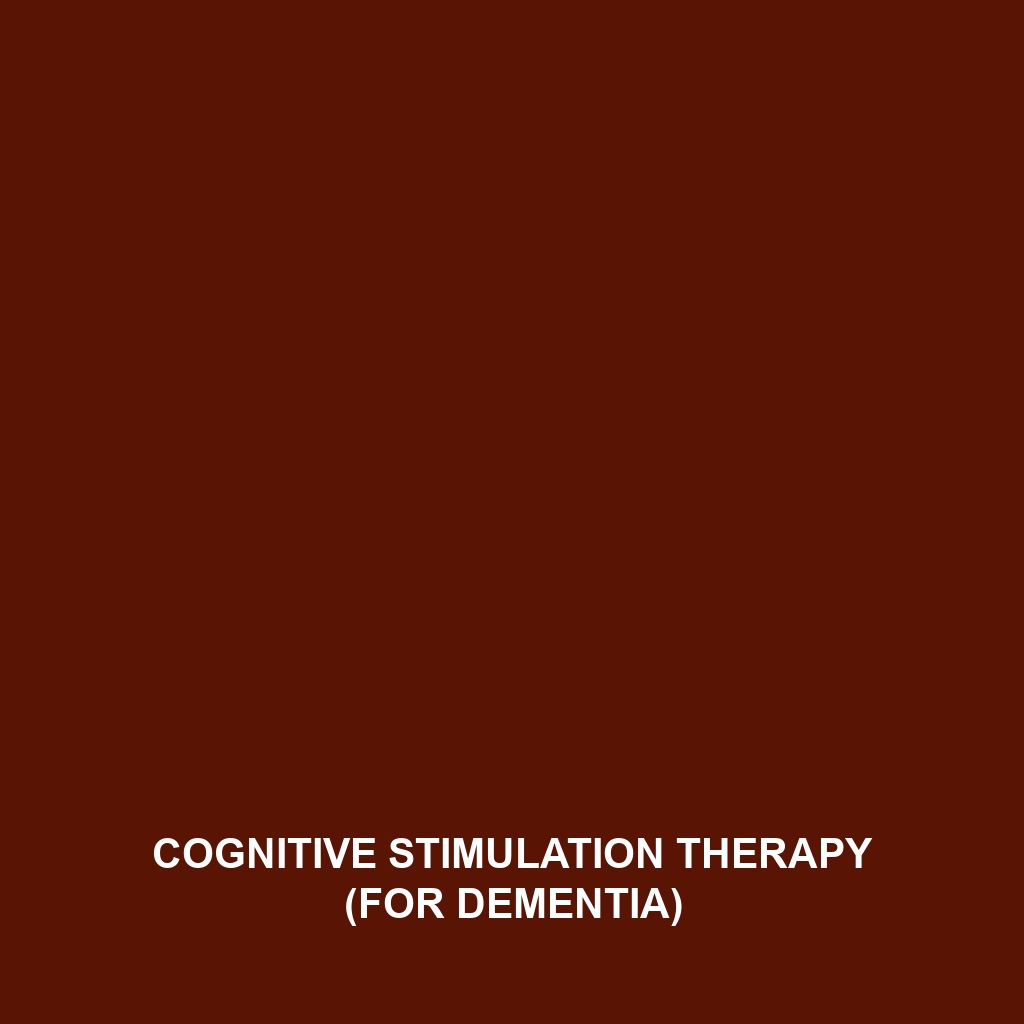Cognitive Stimulation Therapy (for Dementia): A Comprehensive Guide
Overview
Cognitive Stimulation Therapy (CST) is an innovative, evidence-based therapeutic approach designed to enhance the cognitive function and overall quality of life for individuals living with dementia. Developed through extensive research and clinical studies, this engaging therapy focuses on providing mental stimulation through various structured activities and discussions in a supportive group environment. Its primary purpose is to stimulate thinking, memory, and communication in a way that feels enjoyable and socially enriching.
Dementia, a term encompassing various neurocognitive disorders, poses significant challenges to individuals and their families. CST seeks to alleviate some of these challenges by fostering a sense of belonging and purpose, enabling participants to connect with others while maintaining and enhancing their cognitive abilities. As a non-pharmacological intervention, CST emphasizes the importance of an individual’s intrinsic motivation and social interactions, making it a vital component of comprehensive dementia care.
How It Works
Cognitive Stimulation Therapy consists of structured sessions that generally last for about 45 to 60 minutes. Typically conducted in small groups, these sessions use a combination of themed activities aimed at stimulating various cognitive domains. Here’s a closer look at the methodologies involved in CST:
- Thematic Activities: Each CST session revolves around specific themes—such as music, food, or travel—that serve as focal points for discussion and activity. This thematic approach encourages participants to recall their experiences and engage with one another.
- Group Format: Group sessions promote social interaction and create a supportive environment, where individuals share their thoughts and experiences, fostering connections that enhance the therapeutic experience.
- Tailored Exercises: The activities are designed to cater to different cognitive levels. This customization ensures that all participants can engage actively regardless of their cognitive impairment level.
- Encouragement of Recall: Participants are guided to share memories and personal stories tied to the thematic activities, which enhances retention and recollection, crucial aspects of cognitive engagement.
- Completion of Homework Assignments: After each session, participants are given simple activities to do at home, reinforcing the skills they practiced, and providing opportunities for family engagement.
Benefits
The unique approach of Cognitive Stimulation Therapy presents numerous benefits for individuals with dementia. Key advantages include:
- Enhanced Cognitive Function: Regular engagement through CST activities can help improve memory, attention, and overall cognitive skills.
- Improved Quality of Life: Participants often report higher levels of satisfaction and enjoyment in life, as engaging with others boosts emotional well-being.
- Increased Social Interaction: CST promotes communication and connects individuals with peers, reducing feelings of isolation and loneliness.
- Family Involvement: The activities foster family involvement, encouraging communication and shared experiences that engage both the participant and their caregivers.
- Non-Invasive Approach: As a non-drug intervention, CST offers a safe alternative for cognitive enhancement without the side effects associated with medications.
- Adaptability: CST can be adapted to different settings, including homes, care facilities, and community centers, making it widely accessible.
Who It’s For
Cognitive Stimulation Therapy is primarily designed for various individuals diagnosed with dementia. Its target audience includes:
- Individuals with Mild to Moderate Dementia: CST is particularly beneficial for those in early to moderate stages of cognitive decline, as it enables them to actively participate in activities that stimulate engagement.
- Caregivers and Family Members: Caregivers looking for effective methods to connect with loved ones can also benefit from CST. It equips them with activities that they can perform at home to enhance engagement.
- Healthcare Professionals: Therapists, nurses, and caregivers in various settings can adopt CST techniques to enhance their therapeutic strategies in supporting individuals with dementia.
- Community Centers and Day Programs: Organizations focusing on elderly care or adult day programs can integrate CST into their services, providing cognitive stimulation to a larger audience.
Special Features
Cognitive Stimulation Therapy stands out due to several unique features:
- Research-Backed Practice: CST is rooted in extensive research, demonstrating its effectiveness in improving cognitive functioning and quality of life among individuals with dementia.
- Structured Group Sessions: The format emphasizes teamwork and community, promoting social bonds that enhance the therapy’s impact.
- Inclusive and Flexible: CST is adaptable to different group sizes and settings, making it accessible for various facilities and communities.
- Ongoing Training and Resources: CST facilitators have access to various resources and training programs, ensuring they provide the most effective and up-to-date methods for their participants.
- Integration with Other Therapies: CST can be successfully complemented with other therapeutic practices, offering a holistic approach to dementia care.
Why Choose This Service
In an age where dementia increasingly affects a growing segment of the population, Cognitive Stimulation Therapy plays a crucial role in managing cognitive decline while enhancing the overall quality of life for those with dementia. The benefits of cognitive engagement, social interaction, and emotional stimulation through CST cannot be understated. Through its structured approach, CST not only helps individuals maintain cognitive function but also fosters a sense of community, connection, and purpose.
If you are seeking an effective and compassionate way to support yourself or a loved one diagnosed with dementia, Cognitive Stimulation Therapy presents a valuable option. Choose CST as part of a comprehensive dementia care plan to experience the advantages of increased cognitive engagement and improved emotional well-being.
For more information about finding CST programs in your area, or to learn about how you can incorporate Cognitive Stimulation Therapy into your care strategy, reach out to local healthcare providers or explore community services dedicated to dementia care.
